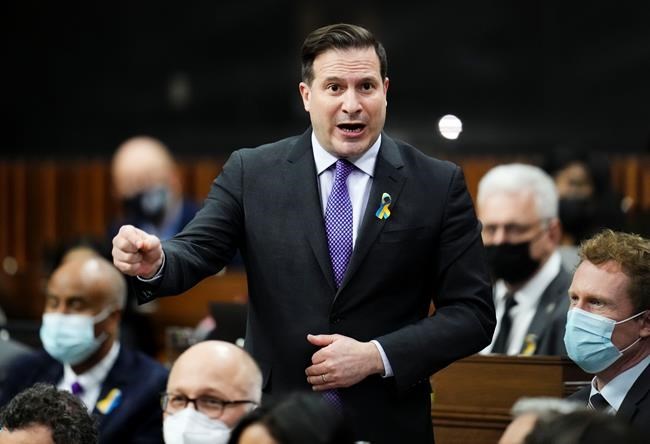
Minister of Public Safety Marco Mendicino rises during question period in the House of Commons on Parliament Hill in Ottawa on Monday, Feb. 28, 2022. Canada’s privacy watchdog is cautiously optimistic about the prospect of a bilateral U.S. deal to streamline access to data in criminal investigations. THE CANADIAN PRESS/Sean Kilpatrick
Republished March 25, 2022 - 12:42 PM
Original Publication Date March 25, 2022 - 9:56 AM
WASHINGTON - Canada's privacy watchdog wants the federal government to ensure any bilateral data-sharing agreement with the United States includes "explicit safeguards" to protect the rights of Canadians.
The two countries agreed this week to pursue a reciprocal deal that would better streamline cross-border criminal investigations, which in the U.S. are often impeded by Canada's stringent privacy protections.
While acknowledging the need for modernized legal procedures in the digital age, privacy commissioner Daniel Therrien is urging the two sides — Canada in particular — to proceed with the utmost caution.
"Careful thought should be given to the appropriate principles and safeguards that should govern such procedures," spokesman Vito Pilieci said in a statement.
"We would support the development of a bilateral agreement to the extent that it provides explicit safeguards and other measures to ensure the protection of Canadians' rights."
Such an agreement would fall under the Clarifying Lawful Overseas Use of Data (CLOUD) Act, passed in 2018, which gives U.S. authorities the power to compel the disclosure of foreign data, in some cases without a warrant.
Law enforcement officials on both sides of the border have complained for years that while the U.S. regularly allows Canadian investigators to access data, police and prosecutors south of the border are often hamstrung when the trail leads them to service providers on the other side.
Absent an agreement, the CLOUD Act essentially gives the U.S. the power to compel co-operation from Canadian providers without Canada having much of a say in the matter.
Provided it includes adequate privacy protections, Pilieci said such an agreement "would be an improvement over the status quo."
Public Safety Minister Marco Mendicino and Justice Minister David Lametti formally agreed to the talks during meetings in D.C. this week with their U.S. counterparts, Homeland Security Secretary Alejandro Mayorkas and Attorney General Merrick Garland.
The goal will be to strike the right balance between privacy and the pressing need to better equip law enforcement with the tools it needs to guard national security and public safety, Mendicino said in an interview Friday.
"Crime moves fast — it moves at the speed of the internet, which is blindingly fast — so this negotiation is an effort to meet that reality, and meet that challenge," he said.
Any such agreement will be designed within the guidelines of the Charter of Rights and Freedoms, in particular Section 8, which protects against unreasonable search and seizure, Mendicino added.
"We're going to be sure to explore the CLOUD Act as a new tool that can help both of our countries bring individuals who may be trying to undermine public safety or national security to justice, but to do so in a way that respects Canadians' privacy."
The meetings comprised a resurrection of the Cross-Border Crime Forum, a bilateral law enforcement summit that dates back to 1997, but had not been convened since 2012.
Resuming the annual event, which will take place in Canada next year, was among the to-do items to emerge from the "road map" for bilateral co-operation that Prime Minister Justin Trudeau and President Joe Biden agreed to last year.
One of the top priorities for Canada at the meetings was to address the issue of illegal firearms, of which the U.S. has long been a primary source — another issue that has grown even more vexing in the high-tech age.
The growth of cheap, accessible 3D-printing technology has allowed the proliferation of homemade weapons known as "ghost guns," which are notoriously difficult to detect and to trace.
Mendicino said he was able to visit the famed FBI training facility in Quantico, Va., where he saw first-hand how U.S. law enforcement is developing tools to track and trace such weapons by following the minute clues left behind by the printers, materials and even the software used in their production.
"We've got to stay ahead of that curve, we've got to make sure that we are staying ahead of the technology," he said.
Working more closely together, Canadian and U.S. officials will be able to "not only compare notes, but then take those notes and use them to improve techniques in counter-surveillance, in detection, in forensics," Mendicino said.
That co-operation "is going to be vitally important in the work to fight against illegal gun trafficking at the border."
This report by The Canadian Press was first published March 25, 2022.
News from © The Canadian Press, 2022